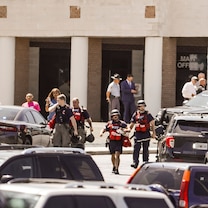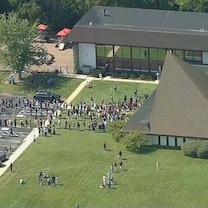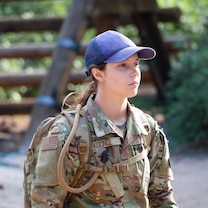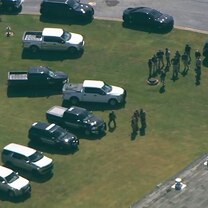Chased away by Israeli settlers, these Palestinians returned to a village in ruins
An entire Palestinian community fled their tiny West Bank village last fall after repeated threats from Israeli settlers with a history of violence
KHIRBET ZANUTA, West Bank -- An entire Palestinian community fled their tiny West Bank village last fall after repeated threats from Israeli settlers with a history of violence. Then, in a rare endorsement of Palestinian land rights, Israel’s highest court ruled this summer the displaced residents of Khirbet Zanuta were entitled to return under the protection of Israeli forces.
But their homecoming has been bittersweet. In the intervening months, nearly all the houses in the village, a health clinic and a school were destroyed — along with the community’s sense of security in the remote desert land where they have farmed and herded sheep for decades.
Roughly 40% of former residents have so far chosen not to return. The 150 or so that have come back are sleeping outside the ruins of their old homes. They say they are determined to rebuild – and to stay – even as settlers once again try to intimidate them into leaving and a court order prevents them from any new construction.
“There is joy, but there are some drawbacks,” said Fayez Suliman Tel, the head of the village council and one of the first to come back to see the ransacked village – roofs seemingly blown off buildings, walls defaced by graffiti.
“The situation is extremely miserable,” Tel said, “but despite that, we are steadfast and staying in our land, and God willing, this displacement will not be repeated.”
The Israeli military body in charge of civilian affairs in the occupied West Bank said in a statement to The Associated Press it had not received any claims of Israeli vandalism of the village, and that it was taking measures to “ensure security and public order” during the villagers’ return.
“The Palestinians erected a number of structural components illegally at the place, and in that regard enforcement proceedings were undertaken in accordance with law,” the statement said.
The villagers of Khirbet Zanuta had long faced harassment and violence from settlers. But after the Oct. 7 attack on Israel by Hamas that launched the war in Gaza, they said they received explicit death threats from Israelis living in an unauthorized outpost up the hill called Meitarim Farm. The outpost is run by Yinon Levi, who has been sanctioned by the U.S., UK, EU and Canada for menacing his Palestinian neighbors.
The villagers say they reported the threats and attacks to Israeli police, but said they got little help. Fearing for their lives, at the end of October, they packed up whatever they could carry and left.
Though settler violence had been rising even before the war under the far-right government of Prime Minister Benjamin Netanyahu, it has been turbocharged ever since Oct. 7. More than 1,500 Palestinians have been displaced by settler violence since then, according to the United Nations, and very few have returned home.
Khirbet Zanuta stands as a rare example. It is unclear if any other displaced community has been granted a court's permission to return since the start of the war.
Even though residents have legal protection Israel's highest court, they still have to contend with Levi and other young men from the Meitarim Farm outpost trying to intimidate them.
Shepherd Fayez Fares Al Samareh, 57, said he returned to Khirbet Zanuta two weeks ago to find that his house had been bulldozed by settlers. The men of his family have joined him in bringing their flocks back home, he said, but conditions in the village are grave.
“The children have not returned and the women as well. Where will they stay? Under the sun?” he said.
Settler surveillance continues: Al Samareh said that every Friday and Saturday, settlers arrive to the village, photographing residents.
Videos taken by human rights activists and obtained by The Associated Press show settlers roaming around Khirbet Zanuta last month, taking pictures of residents as Israeli police look on.
By displacing small villages, rights groups say West Bank settlers like Levi are able to accumulate vast swaths of land, reshaping the map of the occupied territory that Palestinians hope to include in their homeland as part of any two-state solution.
The plight of Khirbet Zanuta is also an example of the limited effectiveness of international sanctions as a means of reducing settler violence in the West Bank. The U.S. recently targeted Hashomer Yosh, a government-funded group that sends volunteers to work on West Bank farms, both legal and illegal, with sanctions. Hashomer Yosh sent volunteers to Levi’s outpost, a Nov. 13 Facebook post said.
“After all 250 Palestinian residents of Khirbet Zanuta were forced to leave, Hashomer Yosh volunteers fenced off the village to prevent the residents from returning,” a U.S. State Department spokesman, Matthew Miller, said last week.
Neither Hashomer Yosh nor Levi responded to a request for comment on intrusions into the village since residents returned. But Levi claimed in a June interview with AP that the land was his, and admitted to taking part in clearing it of Palestinians, though he denied doing so violently.
“Little by little, you feel when you drive on the roads that everyone is closing in on you,” he said at the time. “They’re building everywhere, wherever they want. So you want to do something about it.”
The legal rights guaranteed to Khirbet Zanuta's residents only go so far. Under the terms of the court ruling that allowed them to return, they are forbidden from building new structures across the roughly 1 square kilometer village. The land, the court ruled, is part of an archaeological zone, so any new structures are at risk of demolition.
Distraught but not deterred, the villagers are repairing badly damaged homes, the health clinic and the EU-funded school — by whom, they do not know for sure.
“We will renovate these buildings so that they are qualified to receive students before winter sets in,” Khaled Doudin, the governor of the Hebron region that includes Khirbet Zanuta, said as he stood in the bulldozed school.
“And after that we will continue to rehabilitate it,” he said, “so that we do not give the occupation the opportunity to demolish it again.”




